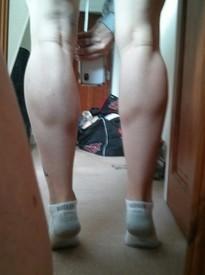Eating back your exercise calories
Options

AlexJFT96
Posts: 11 Member
There is a general mixed reception to eating back your exercise calories, and i'm not sure which way to turn, let me explain my lifestyle though, as it is quite important.
My BMR is around the 1720 mark, and i generally eat just above that (50cal or so), but i also do 45 minutes of exercise a day (treadmill and jump rope) on an empty stomach, now does this still mean i should eat back anything i've burnt, as my body doesn't have any calories to use and would go straight to the fat stores, and that would mean i'd still be lingering around the 1720 mark?
If i'm wrong then i'd only be eating around the 1300 mark, and i'd obviously need to eat more ^^
My BMR is around the 1720 mark, and i generally eat just above that (50cal or so), but i also do 45 minutes of exercise a day (treadmill and jump rope) on an empty stomach, now does this still mean i should eat back anything i've burnt, as my body doesn't have any calories to use and would go straight to the fat stores, and that would mean i'd still be lingering around the 1720 mark?
If i'm wrong then i'd only be eating around the 1300 mark, and i'd obviously need to eat more ^^
0
Replies
-
Why don't you figure out your TDEE and take a 15-25% deficit (lesser if you have less to lose)? This will work in your exercise calories as well as just living (I start out at 1-3 hr active just by doing the stuff I do in the day, no less the exercising). It sounds like you are under-eating by a lot.0
-
Fasted training has no effect on where energy is drawn from, so time of eating cf time of training isn't important.
Largely depends on your priorities, which sound more like composition than weight loss.0 -
Your weight loss is in relation to your overall calorie deficit not whether you train fasted or not. You are doing a significant amount of exercise and it would be foolish not to take that into account whether by following the TDEE method or the MFP eat back exercise calories method.
Weight loss isn't a race and sometimes the "prize" for losing too fast is losing too much lean mass rather than just fat.0 -
copy and pasted from another thread;;
BMR (Basal Metabolic Rate): The number of calories you burn at complete rest.
EAT (Exercise Associated Thermogenesis): Caloric requirements of training, or training expenditure.
NEAT (Non Exercise Activity Thermogenesis): Caloric requirements of activity that is not planned exercise. Vacuuming, driving, brushing your teeth, for example.
TEF/DIT (Thermic Effect of Feeding or Diet Induced Thermogenesis): Caloric expense of eating/digestion.
TDEE: (Total Daily Energy Expenditure) = Sum of the above. BMR+EAT+NEAT+TEF
Exercise calories, as they are typically used in MFP specifically, is represented by EAT in the above definition. Whether or not you should eat your EAT (giggity) depends on what system or method you are using to calculate your intake needs.
If you are using most other online calculation tools to determine an intake estimate, that estimate is going to already include EAT as part of the suggested intake. For example, it will ask you an activity factor that includes an average of your exercise, and with this it increases your TDEE to account for the fact that you are exercising.
If you are using MFP to tell you how much to eat, that estimate is NOT going to include EAT as part of the intake estimate.
Myfitnesspal uses a caloric estimation tool that expects you to eat back calories burned during exercise.
Consequently, MFP will essentially give you a LOWER intake estimate than an external TDEE calculator would give you.
In other words:
You tell MFP: I'd like to lose 1lb/week.
MFP says: Hey, you should eat X calories every day to lose 1lb/week.
You then decide to exercise and you burn 400 calories.
MFP says: Hey you pecker, you said you wanted to lose 1lb/week. Now you need to eat X+400 because you told me you wanted to lose 1lb/week.
So based on this:
If you are using MFP to tell you how many calories to eat, you should probably be eating back some portion of your exercise calories.
If you are using an external calculator and then customizing your intake to match that, you should not be eating back your exercise calories.
Lastly: Exercise expenditure is often over-stated.
My general opinion is that it's much simpler and uses less guess-work to use a custom intake and just forget about the exercise calorie model entirely, but that's a different topic of sorts, more discussion of which can be found here: http://www.myfitnesspal.com/topics/show/819055-setting-your-calorie-and-macro-targets
0 -
You're 19 years old and eating 1720 calories a day total? How tall are you?0
This discussion has been closed.
Categories
- All Categories
- 1.4M Health, Wellness and Goals
- 396.9K Introduce Yourself
- 44.2K Getting Started
- 260.9K Health and Weight Loss
- 176.3K Food and Nutrition
- 47.6K Recipes
- 232.8K Fitness and Exercise
- 452 Sleep, Mindfulness and Overall Wellness
- 6.5K Goal: Maintaining Weight
- 8.7K Goal: Gaining Weight and Body Building
- 153.3K Motivation and Support
- 8.3K Challenges
- 1.3K Debate Club
- 96.5K Chit-Chat
- 2.6K Fun and Games
- 4.5K MyFitnessPal Information
- 16 News and Announcements
- 18 MyFitnessPal Academy
- 1.4K Feature Suggestions and Ideas
- 3.1K MyFitnessPal Tech Support Questions




